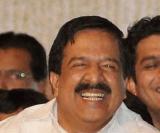 Thiruvananthapuram, Jul 8: Hindi, which is India's national language, isn't an official language in the Kerala assembly, Deputy Speaker N. Sakthan told legislators who were taken aback.
Thiruvananthapuram, Jul 8: Hindi, which is India's national language, isn't an official language in the Kerala assembly, Deputy Speaker N. Sakthan told legislators who were taken aback.
Sakthan was occupying the chair in the assembly during question hour when opposition legislator Jameela Prakasam in her question to Home Minister Ramesh Chennithala, spoke in Hindi.
She asked him what happened to his promise that he would increase the number of women police officials in the state police force from five percent to 10 percent.
At the end of his reply, Chennithala turned to Hindi and assured the house that his promise would become a reality soon.
Sakthan promptly intervened and pointed out that Hindi cannot be used in the house as it's not the official language.
According to him the official languages that can be used on the floor of the assembly include Malayalam, Tamil, Kannada and English.
However, Power Minister Aryadan Mohammed, known to be an authority on the rules and procedures of the assembly, said that Hindi has been used on the floor of the assembly previously .
But Sakthan said as per rule 305 use of Hindi is not allowed as it is not one of the approved languages.
Chief Minister Oommen Chandy noted that if what Sakthan said was true, then we have to change the rule and we should include Hindi. He said if it's not done, then it would send a bad message.
The discussion was resumed in the legislators' canteen where Congress legislator Benny Behenan said the use of Kannada was officially permitted in 1982 and he was there in the assembly that time.
Former speaker K.Radhakrishnan (2006-11) told IANS that during his tenure at a meeting of rules of procedure committee of the Kerala assembly, the issue of including Hindi was taken up.
At that time Aryadan Mohammed, who was then a legislator, asked if it's essential since there is no one who speaks in Hindi. Hence it was not taken up.
"Now if this government wishes to include Hindi, all what needs to be done is to convene the rules of procedure committee and get it approved," said Radhakrishnan.
When the discussion was going on, Sakthan walked in and told IANS: "Only because I informed that Hindi cannot be used as per the rule, all came to know about it. My intention was to highlight this, because sitting in the chair, one has to follow the rules and that's all I did."





Comments
Add new comment